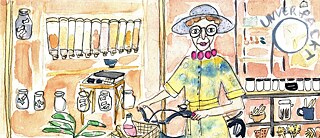Grandma Trude is big on returnables – and has been for a long time. Now she’s coming out against plastic packaging – starting, as always, in her own home.
My Dears,The pandemic restrictions are easing up at long last! And Covid is gradually withdrawing from our lives, at least in Germany. Not only that, but the sun is shining, and I've been swimming in the lake and watching the plants grow in my garden. I’m suddenly in much better spirits!
My energy’s back too, so I’ve immediately invested it in one of the many pet projects that are always at the back of my mind: my goal is to minimize my own plastic consumption – and to spread the word!
Plenty of ways to reduce plastic use at home
As you might imagine, I don’t use much plastic as is. But I’m still discovering lots of different ways to de-plasticize my life and my home. And I’m delighted to see big efforts to that end at supermarkets and drugstores lately too.Just yesterday, for example, I noticed a big box at the drugstore, a sort of “filling station”, where shoppers can refill used plastic receptacles with liquid detergent or dish soap.
A few aisles down, I marvelled at the growing assortment of solid shampoos, which look like bars of soap but are actually shampoo without the plastic bottle. And they really do the job! Meanwhile, good old soap bars are back – and big again. After all, who needs shower gel in a plastic bottle?
I’ve also tried household cleaning products that come in tablets, which you dissolve in water in a reusable spray bottle. I think that's a brilliant brainwave! More and more brands are available online, and you can even find these tablets in paper wrapping at drugstores. I had to get used to the less pungent scent and the watery consistency, but all in all I’m quite content with this cleanser. What’s more, by the way, the tablets take up much less space than plastic bottles, which makes for a much smaller carbon footprint for their transportation.
As I see it, the object is to cut down on plastics in general, not to separate plastics for recycling. After all, who hasn't heard the rumour that our painstakingly sorted plastic trash simply gets shipped off to poor countries... and then? We don't even want to go there. So I play it safe by simply avoiding plastic.
Homemade cream deodorant
Katja, a friend of mine’s daughter, makes my cream deodorant. She regularly refills the same little jars for her friends, which we always bring back for more when we run out of deodorant. Recently, though, I noticed a new stand for unpackaged merchandise at our weekly market selling regionally-produced cream deodorants. So you might find some in your neck of the woods, too.According to Katja, making your own deodorant is a piece of cake. She uses:
- 4 teaspoons coconut oil
- 2 teaspoons shea butter
- 3 teaspoons jojoba oil (for skin care)
- 4 teaspoons baking soda (i.e. sodium bicarbonate – extra-fine, if possible)
- A few drops of essential oils, e.g. bergamot, thyme or rosemary
From Bakelite to microplastics
Back in 1907, who’d have thought that plastics would prove such a mixed blessing? 114 years ago, a Belgian chemist by the name of Leo Hendrik Baekeland developed the world’s first synthetic plastic, which he called Bakelite. It was used to make those pretty black telephones you see in old movies, among other things. Remember them? But now we’re saddled with the curse of the Great Pacific Garbage Patch, an island of mostly microplastics floating in the ocean – and a deadly trap for marine animals. It’s bigger than Germany and can actually be seen from space!Researchers are still investigating the impact of microplastics on human health. They can be found in our food, drinking water and air. Once you start finding out about microplastics, you’ll want to ban all plastics – at least I do. But of course it's not that simple. Because those dastardly tiny plastic particles are released by the abrasion of car tyres, asphalt and even the soles of our shoes, for example. They’re also formed by the disintegration of larger plastic trash. And you’ve all probably heard by now that microplastics are found in cosmetics, too. So they’re a health hazard as well as an environmental menace. But automobile tyres are the main cause of the problem. So can we do anything about microplastics by changing our lifestyle? Yes, we can switch to natural cosmetics, natural cleaning products and public transport.
I was horrified to learn that doing the laundry also releases microparticles into our water – which can eventually make their way into our food. We wouldn’t have this problem if all our clothes were made of traditional natural fibres like cotton, linen, wool, silk or hemp. Synthetic clothes (sportswear), fleece jackets and microfibre cloths for cleaning are particularly harmful. I recently read that, according to a British study, clothing made of synthetic fibres is the biggest source of microplastics found in the water. 977 tonnes of microplastics make it into Germany’s wastewater every year from detergents and cleaning products. But microplastics resulting from the decomposition of larger plastic items in the sea are a much bigger problem. My takeaway: stop using plastic wherever and whenever possible!
Outlawing plastic
Fortunately, the powers that be are finally reacting. Starting 3 July 2021, many single-use plastic products will be banned in the EU, including plastic-stemmed cotton buds, drinking straws, disposable tableware and balloon wands made of plastic. Sounds like a good start! Something’s changing and naturally I'm very happy about that.So have a nice low- or no-plastic month of July and enjoy the sunshine!
Your Trude
June 2021
